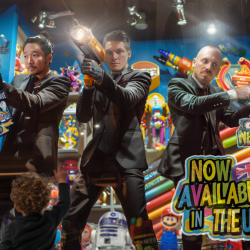With the Mayor of London’s tweet this morning that, for the first time ever, the six Overground lines are getting a name and colour; we decided to ask some marketers what they thought about Transport for London’s branding exercise. Are these historically inspired names a good idea?
Jinan Younis — award-winning diversity, equity and inclusion specialist
A renamed Overground line will likely cause rolled eyes more than celebration. A ‘windrush’ line just reminds us that many victims of the Windrush scandal are still waiting for justice from the government and have no access to legal aid to challenge compensation decisions. A suffragette line only highlights that more than 1,500 officers in UK’s own police force were accused of violence against women and girls in a six-month period. The Mildmay line celebrates the work of Mildmay Hospital for the LGBTQ+ community; while hate crimes against transgender people have hit a record high in England and Wales. Instead of spending £6m on renaming the Overground, people will be more excited to see their trains run regularly due to TfL workers getting a fair wage, victims of the Windrush scandal being adequately compensated, and investment in services that tackle violence against women and the trans community.
The branding of Overground lines to celebrate the diversity of London’s history is a nice add-on, a nod to cultural diversity amidst growing polarisation. But to many, it will feel like a glossy plaster over an ugly undercurrent of injustice.
Kev Chesters — trainer, speaker, lecturer, and co-author of The Creative Nudge
Humans don’t like change so no doubt this’ll unleash the usual torrent of bleating; mostly from types who tend to use the word ‘woke’ a lot in sentences without being able to define what it means. Naming things is rather useful, from a science perspective. It helps with everything from recall to resonance, and everything in between. It’s nice to see some right and proper things get recognition in the names, too. There are probably bigger and better things to worry about. Go for it. And I suspect it’ll annoy all the right people. So that’s a bonus.
Annalisa Roy — Fractional CMO at Axel’s Elixir and Brand Strategy Lead Consultant at Speedo
Naming is a powerful marketing tool, a meaningfully named brand has the power to inspire beyond its immediate definition. In naming these lines Sadiq is purposefully building pieces of London’s identity.
A city that celebrates diversity, respects minorities, supports charitable initiatives and recognises the importance of craftsmanship as an industry. In a nutshell: a liberal, accepting and creative city. Sounds a lot like Sadiq’s mayoral campaign, doesn’t it?
Fadi Dada — Strategy Director at Anomaly

I appreciate the intention behind this project. Creating distinct Overground lines is long overdue. I use the Overground every day and still find it perplexing and confusing. But couldn’t the new lines be named in a way that is more accessible to non-English speakers and visitors in London? Or in a way that provides people with a clearer sense of the direction they are travelling? The new names pay homage to history deserving of greater veneration… so no complaints there. But more consideration could have been given to how the new names will interact with the real world. What happens when TfL need to announce:
Overcrowding on the Windrush line
An incident on the Suffragette line
A severe fault on the Lioness line
And will people really say ‘Just hopping on the Windrush, see you soon’?
I can’t help but feel that PR has been prioritised over accessibility, clarity and way-finding.
Jenny Zhang — Strategy Director at CALLING
It strengthens the connection between people and the places they share. TfL is a common ground for all; it’s a cross-section of society that represents London.
In order to preserve and nourish what makes London unique, we need to do this to avoid becoming another soulless metropolis in an ever more digitised world.
Featured image: Edward Howell / Unsplash





























